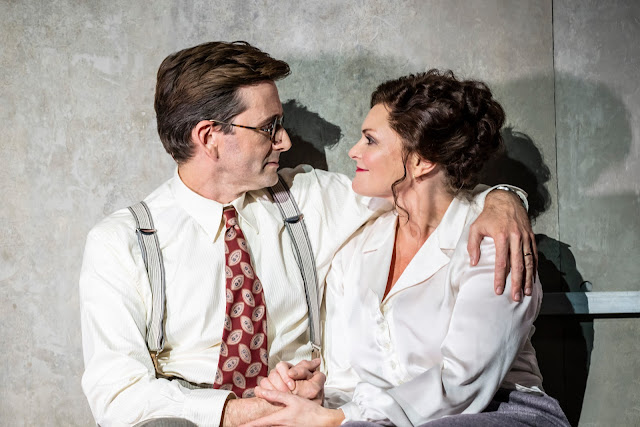
Good deals with the corruption of Germany's intellectual elite under the influence of Nazism. The class that might have been expected to act as that country's moral conscience is represented by John Halder. He is a professor of literature and apparently a 'good' man. However, he is prepared to euthanise his nation's past, symbolised by his mother who now suffers from dementia, and to abandon its vague and ineffective present modelled by his wife, Helen. At the same time, he corrupts the country's future depicted by his naive student and second wife, Anne. In the city of Goethe, he makes a Faustian bargain to protect his own small world as he aligns with the political evil that is engulfing his society, and he refuses to protect his Jewish friend, Maurice, who serves as a form of alter ego. David Tennant's portrayal of the analytic and detached professor who slips into clever rationalisation and slippery sophistry is positively enthralling. He embodies his character in every expression and movement and manages to express Halder's disconnection in even the smallest gesture. As the women in Halder's life, and also as his Nazi friend, Freddie, Sharon Small simply stuns with her ability to shift instantaneously between these various personae and yet to make them all believable. Elliot Levey is equally compelling as Maurice, the totally integrated German Jew who is as confused as he is terrified by his sudden designation as 'the other.' While Halder is haunted by the music of his country, he is also dissociated from this expression of the emotional, perhaps, spiritual side of his culture which he ultimately confronts poignantly expressed amidst the horrors of Auschwitz. C.P. Taylor's play is a brilliant illustration of Hannah Arendt's thesis about the banality of evil, and this extraordinary production is bound to linger with everyone who sees it. It is a powerful warning from the past about the present challenges faced by all of us.
Rated: ★★★★★
Reviewed by J.C.
Photo by Johan Persson.
Want to save on tickets? See our Tips page.
When, Where, Getting there:


%20and%20Mason%20Alexander%20Park%20(Mary%20Todd%20Lincoln).%20Photo%20by%20Manuel%20Harlan.jpg)
.jpg)

,%20Chris%20Walley%20(Treat),%20and%20Forbes%20Masson%20(Harold)%20-%20credit%20Charlie%20Flint%20(1).jpg)
,%20Billy%20Crudup%20(Will%20Kane)%20and%20Company.%20Photo%20Johan%20Persson%20(2).jpg)



,%20Sule%20Rimi%20(Andy),%20Sheridan%20Smith%20(Susan)%20and%20Safia%20Oakley-Green%20(Lucy).%20Photo%20by%20Marc%20Brenner.jpg)